 ^ Click ^
^ Click ^ WE Editors, science-types, are constantly amazed at the sheer volume of panicky and convoluted narrative about climate and water that passes for "news" in the local press. WE are not alone. For the cold, hard truth about our local climate and glaciers, read on.
On Wednesday, Nov. 20, Michelle Koppes gave a talk to the Bellingham City Club, which was featured in the Bellingham Herald (“Bellingham audience told glaciers, oysters show climate change impacts”) and on the city’s TV program. Koppes claimed that
(1) The climate is warming and “it’s not just happening here, it’s happening all over the world.” Human emissions of CO2 are causing global warming and warming is “expected to get worse as average temperatures keep trend up in the decades ahead. And the uptrend is expected to accelerate in the 21st century.”
(2) “here and almost everywhere else in the world, the mountain snow accumulations that feed the glaciers are dwindling.”
(3) “The amount of water stored in mountain snow is down 45 to 60 percent since 1950.”
(4) “shrinkage of Cascade glaciers seems to be accelerating”….”glaciers on Mt. Baker…..have lost 20 percent of their volume since 1990.“
Are these assertions by Koppes valid and supported by credible data? What supporting evidence did she present as proof of her contentions? Let’s look at each of her claims.
(1) What evidence did Koppes cite that the climate is warming here and all over the world? The answer is simple—none at all. She simply states that the climate is warming, despite indisputable data to the contrary. But there is abundant data concerning this issue. As shown by temperature measurements from both land stations and satellites, NO global warming has occurred for the past 17 years! Figure 1 shows that global cooling has actually occurred during the last decade.
Even the chairman of the UN IPCC (Intergovernmental Panel on Climate Change) has publicly admitted that there has been no global warming for the past 17 years. So why did Koppes tell the City Club that the global climate and the climate here is warming at an accelerating rate? Can she really be unaware of the uncontested fact that data shows no global warming in the past 17 years when virtually all other scientists know about it.?
That’s the global situation—what about the U.S.? NOAA data shows that from 1998 to 2013, 46 of the 48 mainland states cooled at an average rate -14.7°F per century and winter temperatures have cooled at rates of 1-8.7°F per decade (Fig. 2), i.e, the climate isn’t warming, it’s cooling!
What about local temperature trends? NOAA data show that Washington winters have cooled at a rate of -13°F per century, spring temperatures have cooled at a rate of -7.8°F per century, and summers have cooled at a rate of 0.5°F per century.
What about local temperatures here? Figure 3 shows that average annual temperatures for the western Cascades over the past 15 years have cooled by more than a degree and a half!
So where did Koppes get the idea that the climate is warming at an accelerating rate? Apparently she is still quoting obsolete IPCC computer model temperatures that have been proven to be wrong (too warm) by a full degree F and are totally worthless. Even the IPCC admits that their computer modeled temperatures were badly wrong. The bottom line here is that the ‘accelerated warming’ cited by Koppes is NOT happening and she ignores the actual measured temperature record that is accepted by even the IPCC!
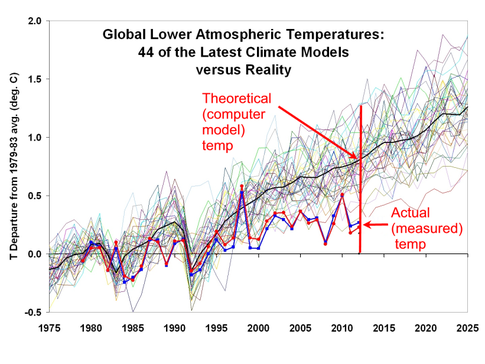
(2) Koppes claims that “here and almost everywhere else in the world, the mountain snow accumulations that feed the glaciers are dwindling.” Data is available (Fig. 5) and it shows that five of the six snowiest years in the Northern Hemisphere have occurred since 2003 (NOAA).
(3) Koppes claims that “The amount of water stored in mountain snow is down 45 to 60 percent since 1950.” The snowpack in Washington goes up and down from year to year, but the snow-water equivalent in Washington in the past 25 years has been growing, not declining as claimed by Koppes (Fig. 6). How she could claim a 45 to 60 percent decrease in snow-water equivalent is amazing.
(4) “...shrinkage of Cascade glaciers seems to be accelerating”… Glaciers advance and retreat as climate warms and cools. Koppes seems to be unaware of many published papers showing that Mt. Baker glaciers advanced almost to their Little Ice Age (1300 to 1915 AD) positions during the 1880 to 1915 cold period, then retreated strongly upvalley during the 1915 to 1945 warm period (WITHOUT ANY SIGNIFICANT INCREASE IN CO2!). This is important because it shows that Mt. Baker glaciers retreated upvalley well before CO2 began to increase significantly from 1945 on, i.e., CO2 cannot be the cause of this glacier retreat. The climate turned cooler again from 1945 to 1977 and the glaciers readvanced about twice as far downvalley as they had retreated during the 1915 to 1945 recession, all during the time of maximum CO2 emissions (after 1945)! This is even more important, because it shows that for ~30 years (~1945-1977) during the sharpest increase in human CO2 emissions, glaciers on Mt. Baker advanced strongly, just the opposite of what they should have done if CO2 causes warming. In 1978, the climate warmed again and the glaciers have again retreated upvalley. Thus, Koppe’s contentions that Cascade glaciers are retreating at an accelerating rate totally ignores the strong glacier advance from 1945 to 1980 when CO2 was soaring.
Koppes claims that "glaciers on Mt. Baker…..have lost 20 percent of their volume since 1990." This one is mind-boggling! Fig. 7 shows the amount of retreat of the Coleman glacier terminus from 1993 to 2011 and the total length of the glacier. Keeping in mind that glaciers thicken rapidly upvalley from their terminus, the total amount of ice loss since 1990 can’t be more than a few percent. Other glaciers show the same relationship. How any competent glaciologist could come to such a conclusion is hard to imagine.
CONCLUSIONS
Considering all of these easily confirmed facts that Koppes omitted, her conclusions are badly flawed (some are outright falsehoods) and her contentions are not scientifically defensible.
Dr. Don Easterbrook, PhD
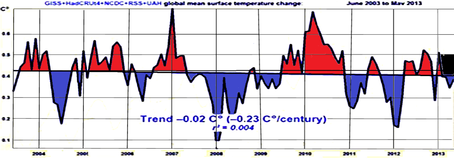
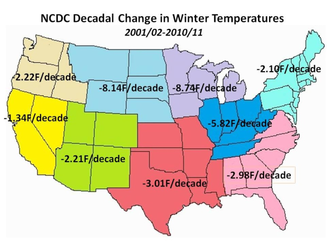
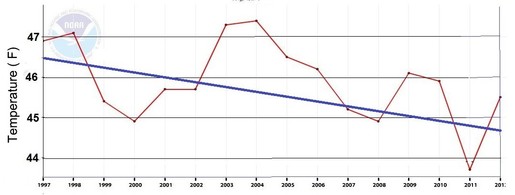
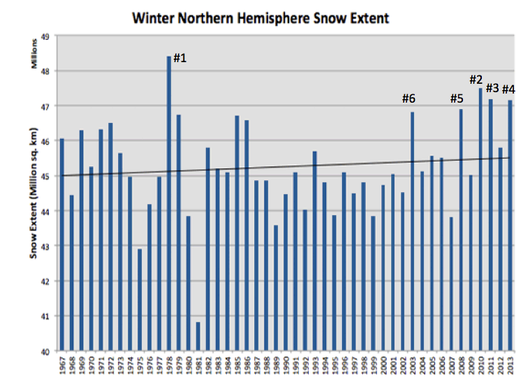
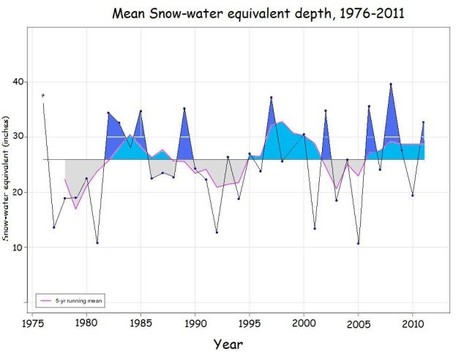
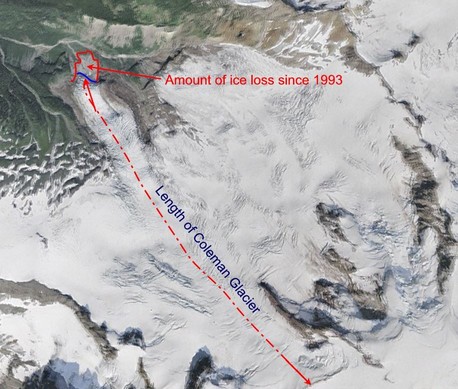

 RSS Feed
RSS Feed
